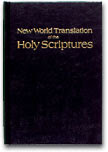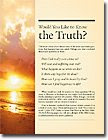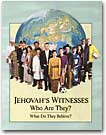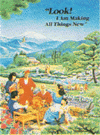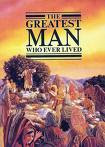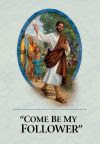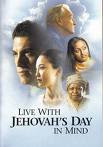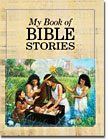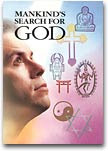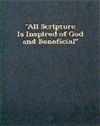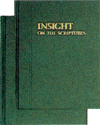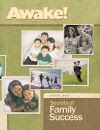"Then all the officials of the king of Babylon came and took seats in the Middle Gate: Nergal-Sharezer of Samgar, Nebo-Sarsekim a chief officer, Nergal-Sharezer a high official and all the other officials of the king of Babylon."-Jeremiah 39:3
Again, Archaeology proves the authenticity of the Bible. A relatively unknown, unimportant man, mentioned once in the Bible as visiting Jerusalem during its siege, has been proved to have actually existed. How? A receipt was found. A receipt! This receipt bore his name as having donated 0.75kg of gold to a temple in Babylon.
Links:
Ancient Document Confirms Existence of Biblical Figure
Nebo-Sarsekim Tablet
Friday, October 31, 2008
Thursday, October 30, 2008
Christians Can Learn from King Josiah (2 Chronicles 34-35)
"Josiah was eight years old when he began to reign; and he reigned thirty-one years in Jerusalem. He did that which was right in the eyes of Yahweh, and walked in the ways of David his father, and didn't turn aside to the right hand or to the left."-2 Chronicles 34:1-2, World English Bible
King Josiah was one of the few kings who did what was right in the eyes of God. He remained faithful all of his days, unlike his father King Amon and grandfather, King Manasseh. The Bible tells us that it wasn't until King Josiah was sixteen that he started to search for his God. He instantly started destroying all the high places, sacred poles, images and statues that his father Amon must have put up, for Manasseh had taken them down after his conversion. (2 Chronicles 33:12-13, 15; 34:3-5) Josiah even went even further, going into the northern kingdom of Israel, eradicating Baal worship from a country that wasn't even his.-2 Chronicles 34:6-7
Did all of this prove to be enough for Josiah, the sixteen year old king? No. Ten years later, after false worship was no longer in the land, Josiah set out to do repair work on the temple. Being led by three men, Shaphan, Maaseiah, and Joah, repairs were started. While all of this was going on, something truly magnificent was found! The original book of the Law written by the hand of Moses! (2 Chronicles 34:8-14) The book of the Law was read to King Josiah. How did he react?-2 Chronicles 34:18
The Bible says that Josiah "tore his clothes". (2 Chronicles 34:19) In those times, tearing ones clothes was a sign of extreme distress. A faithful man named Jephthah tore his clothes when he realized that he had to give his daughter to Jehovah's service after making a vow. He did this because this was his only child--a sad time indeed for this man. (Judges 11:30-31, 34-35) What was in the book of the Law that tore at Josiah's heart?
We do not know what King Josiah heard that touched him so deeply. He did, though, immediately send people to pray to God on his behalf about the sins of the people. His words were "Go you, inquire of Yahweh for me...for great is the wrath of Yahweh that is poured out on us, because our fathers have not kept the word of Yahweh, to do according to all that is written in this book." (2 Chronicles 34:21, WEB) What was Jehovah's answer to this? He told them of the coming "calamity" that was to befall Judah--the fall of the country to Babylon--that was to come later. God was going to spare the country now because of the faith of Josiah and his repentance for not keeping the entire Law.-2 Chronicles 34:24, 27-28
After this, Josiah made a Covenant to follow Jehovah all the days of his life. He would keep all of his commandments, testimonies, and regulations. He then turned his attention towards the peoples of Judah and the northern kingdom of Israel. He charged them to repent, which they did, and then removed all of the detestable things out of the rest of Israel.-2 Chronicles 34:32-33
Josiah then proceeded to hold a Passover on Nisan 14, the anniversary of the day the angel of death flew over Egypt, killing the firstborn, and of the Exodus. They sacrificed thousands of animals to God being contributed from all sorts of people. This turned out to be the biggest Passover in hundreds of years! (2 Chronicles 35:1, 7-9, 17-18) What faith King Josiah had! What lesson is there for us today?-Romans 15:4
If you were one of few people who followed the true God today, the rest were scattered and few, and you followed the commandments in the Bible--go to church, preach, etc. (Hebrews 10:24-25; Matthew 28:19-20) and then found out there was more then just that, would you do it? Remember, you are one of the only people in your area that worships God. Would you perhaps feel that maybe you were already doing enough? If you found out that God required more, could you get the attitude that perhaps since you were the only one serving God, that was enough?
Sadly, that is the view of many today. They think that going to church and talking about God, while good, is enough. God requires more.
Our conduct has to be that befitting Christians. (1 Peter 2:12) Many people feel that after we turn around, we can continue doing what we want to do. That is not the way that it is. Paul wrote: "What shall we say then? Shall we continue in sin, that grace may abound? May it never be! We who died to sin, how could we live in it any longer?" (Romans 6:1-2) Can we continue to sin just because we are saved? Absolutely not! We have to learn to walk by spirit. If we do, we will carry out no fleshly desire at all. (Galatians 5:16) Continuing to sin willfully after repentance will mean that we are "trampl[ing] upon the Son of God", viewing as "ordinary value the blood of the covenant by which [we were] sanctified", and "insult[ing] the spirit."-Hebrews 10:26, 29
There are certain things that a Christian cannot do. Practice homosexuality, murder, be deceitful, malicious, slanderers, backbiters, hateful to God, insolent, arrogant, disobedient to parents, without understanding, be closed to any agreement, merciless, fornicators, greedy, extortioners, idolaters. We cannot practice spiritism, the occult, witchcraft, be superstitious, be jealous, have fits of anger, divide, get drunk, have wild parties, and things like these. (Romans 1:26-31; 1 Corinthians 5:9-11; Galatians 5:20-21) When we find out that there is more things that God requires of us then just going to church and preaching, we need to be like King Josiah and do it. He had already done a lot in service to God but when he found more was needed, he did it.
Another important thing to do is watch our appearance. Both Paul and Peter speak of how a Christian's appearance should be. Paul says, "Likewise, I desire the women (and all Christians, men and women) to adorn themselves in well-arranged dress, with modesty and soundness of mind, not with styles of hair braiding and gold or pearls or very expensive garb." Peter says, "Do not let your adornment be that of the external braiding of the hair and of the putting on of gold ornaments or the wearing of outer garments." (1 Timothy 2:9; 1 Peter 3:3) Why would they say all of this?
Paul and Peter are telling us that looking good is not what is important for a Christian. We shouldn't use our outward appearances to impress people. Appearances sure do not impress God. (1 Samuel 16:7) What is important is what type of people Christians are on the inside. Paul and Peter conclude by telling us to adorn ourselves "in the way that befits women [and all Christians] professing to reverence God, namely, through good works." Peter concludes his thought with: "Let it be the secret person of the heart in the incorruptible apparel of the quiet and mild spirit." (1 Timothy 2:10; 1 Peter 3:4) Who we are on the inside and the way we conduct ourselves is what should impress people who are not Christian. That is what is truly important. That is what we need to groom.
Last, when doing more, we should follow the advice in the Bible to do all we can for other people. (Galatians 6:2) We are supposed to help other people, Christians and non-Christians alike.-Galatians 6:10
The most important point, though, is how we care for a certain temple today. We cannot do repair work on the actual temple like Josiah did. However, we do have a temple that we can constantly "repair", as it were. 1 Corinthians 3:16-17 talks of the temple of your body. This is one temple that needs to be taken constant care of. Jesus said, "Not what enters into his mouth defiles a man; but it is what proceeds out of his mouth that defiles him." (Matthew 15:11) We are to be careful of how we talk because we do not want to "defile" God's temple. Being called a temple shows the importance of our Christian Way.
There is much embodied in the Christian way of life. When we learn what God truly expects of a Christian, we should strive to do it. Remember, God put the account of King Josiah in the Bible for a reason. We need to learn from it, use it in our lives. (2 Timothy 3:16-17) Then we can truly be a holy temple.
King Josiah was one of the few kings who did what was right in the eyes of God. He remained faithful all of his days, unlike his father King Amon and grandfather, King Manasseh. The Bible tells us that it wasn't until King Josiah was sixteen that he started to search for his God. He instantly started destroying all the high places, sacred poles, images and statues that his father Amon must have put up, for Manasseh had taken them down after his conversion. (2 Chronicles 33:12-13, 15; 34:3-5) Josiah even went even further, going into the northern kingdom of Israel, eradicating Baal worship from a country that wasn't even his.-2 Chronicles 34:6-7
Did all of this prove to be enough for Josiah, the sixteen year old king? No. Ten years later, after false worship was no longer in the land, Josiah set out to do repair work on the temple. Being led by three men, Shaphan, Maaseiah, and Joah, repairs were started. While all of this was going on, something truly magnificent was found! The original book of the Law written by the hand of Moses! (2 Chronicles 34:8-14) The book of the Law was read to King Josiah. How did he react?-2 Chronicles 34:18
The Bible says that Josiah "tore his clothes". (2 Chronicles 34:19) In those times, tearing ones clothes was a sign of extreme distress. A faithful man named Jephthah tore his clothes when he realized that he had to give his daughter to Jehovah's service after making a vow. He did this because this was his only child--a sad time indeed for this man. (Judges 11:30-31, 34-35) What was in the book of the Law that tore at Josiah's heart?
We do not know what King Josiah heard that touched him so deeply. He did, though, immediately send people to pray to God on his behalf about the sins of the people. His words were "Go you, inquire of Yahweh for me...for great is the wrath of Yahweh that is poured out on us, because our fathers have not kept the word of Yahweh, to do according to all that is written in this book." (2 Chronicles 34:21, WEB) What was Jehovah's answer to this? He told them of the coming "calamity" that was to befall Judah--the fall of the country to Babylon--that was to come later. God was going to spare the country now because of the faith of Josiah and his repentance for not keeping the entire Law.-2 Chronicles 34:24, 27-28
After this, Josiah made a Covenant to follow Jehovah all the days of his life. He would keep all of his commandments, testimonies, and regulations. He then turned his attention towards the peoples of Judah and the northern kingdom of Israel. He charged them to repent, which they did, and then removed all of the detestable things out of the rest of Israel.-2 Chronicles 34:32-33
Josiah then proceeded to hold a Passover on Nisan 14, the anniversary of the day the angel of death flew over Egypt, killing the firstborn, and of the Exodus. They sacrificed thousands of animals to God being contributed from all sorts of people. This turned out to be the biggest Passover in hundreds of years! (2 Chronicles 35:1, 7-9, 17-18) What faith King Josiah had! What lesson is there for us today?-Romans 15:4
If you were one of few people who followed the true God today, the rest were scattered and few, and you followed the commandments in the Bible--go to church, preach, etc. (Hebrews 10:24-25; Matthew 28:19-20) and then found out there was more then just that, would you do it? Remember, you are one of the only people in your area that worships God. Would you perhaps feel that maybe you were already doing enough? If you found out that God required more, could you get the attitude that perhaps since you were the only one serving God, that was enough?
Sadly, that is the view of many today. They think that going to church and talking about God, while good, is enough. God requires more.
Our conduct has to be that befitting Christians. (1 Peter 2:12) Many people feel that after we turn around, we can continue doing what we want to do. That is not the way that it is. Paul wrote: "What shall we say then? Shall we continue in sin, that grace may abound? May it never be! We who died to sin, how could we live in it any longer?" (Romans 6:1-2) Can we continue to sin just because we are saved? Absolutely not! We have to learn to walk by spirit. If we do, we will carry out no fleshly desire at all. (Galatians 5:16) Continuing to sin willfully after repentance will mean that we are "trampl[ing] upon the Son of God", viewing as "ordinary value the blood of the covenant by which [we were] sanctified", and "insult[ing] the spirit."-Hebrews 10:26, 29
There are certain things that a Christian cannot do. Practice homosexuality, murder, be deceitful, malicious, slanderers, backbiters, hateful to God, insolent, arrogant, disobedient to parents, without understanding, be closed to any agreement, merciless, fornicators, greedy, extortioners, idolaters. We cannot practice spiritism, the occult, witchcraft, be superstitious, be jealous, have fits of anger, divide, get drunk, have wild parties, and things like these. (Romans 1:26-31; 1 Corinthians 5:9-11; Galatians 5:20-21) When we find out that there is more things that God requires of us then just going to church and preaching, we need to be like King Josiah and do it. He had already done a lot in service to God but when he found more was needed, he did it.
Another important thing to do is watch our appearance. Both Paul and Peter speak of how a Christian's appearance should be. Paul says, "Likewise, I desire the women (and all Christians, men and women) to adorn themselves in well-arranged dress, with modesty and soundness of mind, not with styles of hair braiding and gold or pearls or very expensive garb." Peter says, "Do not let your adornment be that of the external braiding of the hair and of the putting on of gold ornaments or the wearing of outer garments." (1 Timothy 2:9; 1 Peter 3:3) Why would they say all of this?
Paul and Peter are telling us that looking good is not what is important for a Christian. We shouldn't use our outward appearances to impress people. Appearances sure do not impress God. (1 Samuel 16:7) What is important is what type of people Christians are on the inside. Paul and Peter conclude by telling us to adorn ourselves "in the way that befits women [and all Christians] professing to reverence God, namely, through good works." Peter concludes his thought with: "Let it be the secret person of the heart in the incorruptible apparel of the quiet and mild spirit." (1 Timothy 2:10; 1 Peter 3:4) Who we are on the inside and the way we conduct ourselves is what should impress people who are not Christian. That is what is truly important. That is what we need to groom.
Last, when doing more, we should follow the advice in the Bible to do all we can for other people. (Galatians 6:2) We are supposed to help other people, Christians and non-Christians alike.-Galatians 6:10
The most important point, though, is how we care for a certain temple today. We cannot do repair work on the actual temple like Josiah did. However, we do have a temple that we can constantly "repair", as it were. 1 Corinthians 3:16-17 talks of the temple of your body. This is one temple that needs to be taken constant care of. Jesus said, "Not what enters into his mouth defiles a man; but it is what proceeds out of his mouth that defiles him." (Matthew 15:11) We are to be careful of how we talk because we do not want to "defile" God's temple. Being called a temple shows the importance of our Christian Way.
There is much embodied in the Christian way of life. When we learn what God truly expects of a Christian, we should strive to do it. Remember, God put the account of King Josiah in the Bible for a reason. We need to learn from it, use it in our lives. (2 Timothy 3:16-17) Then we can truly be a holy temple.
Monday, October 27, 2008
The Song of Solomon
Many people look at the Song of Solomon in disgust. They claim that it is too erotic. Joseph Smith, the founder of Mormonism, took this book out of his Bible, claiming that it was not inspired because of how erotic it was. Is this the case? Is a book that many claim is erotic capable of being inspired of God? Is a book that many claim is erotic capable of being inspired of God? In the words of one Mormon, "The Song of Solomon talks about breasts! How can a book that talks about breasts be inspired?"
First, let us look at all of the books of the Bible that talk about breasts.
In the book of Proverbs, there is a section that speaks of how we should view our wives. We should find our delight only in her. There should be no thoughts of other women at all. That is what the following Scripture is speaking of. In Proverbs 5, we find, "May your fountain be blessed, and may you rejoice in the wife of your youth. A loving doe, a graceful deer—may her breasts satisfy you always, may you ever be captivated by her love."-Proverbs 5:18-19
While Proverbs is not full of references to breasts, as some may argue, neither is Song of Solomon. In fact, the word breasts only appears 8 times throughout the entire book, although this is more then any other book. (Song of Solomon 1:13; 4:5; 7:3, 7-8; 8:1, 8, 10) The usage of the word is also not in a derogatory manner. Other books that mention breasts in a non-derogatory way are Job, Isaiah, Ezekiel, Hosea, and Nahum.-Job 3:12; Isaiah 60:16; 66:11; Hosea 2:2; 9:14; Nahum 2:7
One Scripture that many point to when arguing against the Song of Solomon is this one. "I found the one whom my soul has loved. I grabbed hold of him, and I would not let go of him, until I had brought him into my mother’s house and into the interior room of her that had been pregnant with me." (Song of Solomon 3:4) At this point, the Shulammite is dreaming of searching for her beloved. (Song of Solomon 3:1) She makes this statement after finding him. However, dreams tell us many things about the desires of a person. The Shulammite wants to bring the Shepherd boy into her mother's tent. Does this here mean that she wants to commit immorality?
No. In the ancient Middle East, marriage ceremonies went on for days. On the third day of the ceremony, the two newlyweds would enter into the tent of the mother of one of them. They would have intercourse, which would seal the marriage. Biblical evidence of this is found at Genesis 24:67 where we read: "After that Isaac brought her into the tent of Sarah his mother. Thus he took Rebekah and she became his wife."
A Bible commentary confirms this by saying, "The women in the East have all separate apartments, into which no person ever attempts to enter except the husband. We find Isaac bringing Rebecca into his mother's tent, when he made her his wife, Genesis 24:67. What is here related appears to refer to the third night of the nuptials." [1] People's ignorance of ancient customs has caused many misunderstandings throughout the world's history, some of them being deadly. How sad it would be if some ignorant person concluded that the Song of Solomon was mistakenly inserted into the Biblical canon and so chose to ignore this inspired book! Yes, research is important.
In the book of Ezekiel, chapter 23 is probably the most sexually explicit chapters in the entire Bible. This chapter says things like, "They became prostitutes in Egypt, engaging in prostitution from their youth. In that land their breasts were fondled and their virgin bosoms caressed." "She did not give up the prostitution she began in Egypt, when during her youth men slept with her, caressed her virgin bosom and poured out their lust upon her." "Then the Babylonians came to her, to the bed of love, and in their lust they defiled her." "There she lusted after her lovers, whose genitals were like those of donkeys and whose emission was like that of horses. So you longed for the lewdness of your youth, when in Egypt your bosom was caressed and your young breasts fondled."-Ezekiel 23:3, 8, 17, 20-21, see also Ezekiel 16:1-9
Should the book of Ezekiel be excluded from the Bible due to this? Not at all. There are many gems in this book that are well worth our attention. Song of Solomon is no different. When people read this book, they can only see the sexual statements in it. These need to open their minds and look at it in the light of its inspiration. What is God trying to tell us here?
The second thing that people need to understand when reading the Song of Solomon is the context of this book. Not the internal context but the external. When was it written? Where was it written? Why was it written?
Song of Solomon was written in the Middle East over three thousand years ago. The culture then was different then it is today. The people and their beliefs were different. The way they looked at a womans breasts was most different, too. Today breasts are looked at in more of a sexual manner. In Solomon's day, breasts were seen as no different then any other part of the body; they were not seen as overly sexual. There are other things in this short book that we cannot imagine saying--things that are not of a sexual nature.
Many of the times that the word "breasts" is used in this book, it is in describing the physical features of the Shulammite. Someone says of her in at least one instance: "Your breasts are like two fawns, twins of a gazelle." (Song of Solomon 7:3) If you continue reading that chapter, you find that the entire thing is about how beautiful she looks to the speaker. Yes, today few of us would be caught dead saying to a woman the above, but he says other things that are downright silly to use. Things like: "Your hair is like a flock of goats" "Your teeth are like a flock of sheep just shorn" "You waist is a mound of wheat" "Your neck is like an ivory tower".-Song of Solomon 4:1-2; 7:2, 4
Third, when we are mature enough to ignore the sexual statements in the book, what can we find that is beneficial on a spiritual level? Trust me, there are some.
The Song of Solomon answers questions such as these:
1. How should you appear when before someone of the opposite sex, whether you have a relationship with them or not?
2. How should you view the person you are with in relation to others of the opposite sex?
3. How should you act when it comes to sexual activity outside of marriage?
While these are questions that we should already know the answer to, we need to examine all aspects of God's inspired Word to get an all around picture and also because it is good to have a Godly reminder of such things as these. So:
How should you appear when before someone of the opposite sex, whether you have a relationship with them or not?
In what is possibly a dream, the Shulammite was awakened by a knocking at the door to her bedroom. It is the young man that she loves! He asks her to open the door. (Song of Solomon 5:2) Now, the young woman is naked, or partially so, because she is in bed. What does she do? She really wants to see him. Will she put herself in a position that will possibly cause them to commit immorality because she lets him in while her appearance is inappropriate? No.
"I have taken off my robe—must I put it on again? I have washed my feet—must I soil them again?" she asks him. (Song of Solomon 5:3) From there the man leaves her and she realizes how much she wants him. She gets up to find him but he is gone. She then goes around the city to find him, with no success. (Song of Solomon 5:4-6) We even find out that she had first put her clothes on because later she is attacked and the "watchmen" take her clothes off her.-Song of Solomon 5:7
So, the Shulammite is a noble example of how a man and a woman should act when they are indecent in appearance. Do not even allow opportunity for you to be alone in a situation like that. Like the Shulammite, no matter if you want to see this person, all efforts must be taken to keep any type of sexual sin from occurring.
Second: How should you view the person you are with in relation to others of the opposite sex?
Again, we can take a lesson from the Shulammite and her boyfriend. The Shulammite and her boyfriend a mutually exclusive towards one another. The thought of either of them being with another person, or even looking at another person, is the last thing in their minds. Throughout the entire Song, they both use words that show that they are exclusive, like "girl companion of mine" and "my dear one." (Song of Solomon 1:15; 4:16) Throughout the entire song, they constantly reaffirm their exclusivity towards one another, saying, "I am my beloved's, and my beloved is mine." (Song of Solomon 6:3, Young's Literal Translation) Of her, to prove his exclusive devotion, we read: "I am my beloved's, and on me is his desire."-Song of Solomon 7:10, YLT
The two characters of the Song are wonderful examples on how exclusive two Christians, even if they are only dating, should view one another. If you cannot be exclusive while dating, as these two were, how can you be that way in marriage?
Last: How should you act when it comes to sexual activity outside of marriage?
In the last chapter of the Song, we see a dialouge between the Shulammite and her brothers. They speak of a little sister who has not become fully developed, or mature. They say that if she is a door, they will build a wall in front of her. If she is a wall, they will decorate her with silver. The Shulammite then tells them that she is a wall. (Song of Solomon 8:8-10) They are speaking of sexual activity. If the little sister is a door, "opening up" for just any man, her brothers will be a wall towards her. They will not let her disgrace herself. If she is a wall, barring herself from any sexual immorality, then they will praise her. The Shulammite then tells them that she is a wall. She, happily, has kept herself pure and undefiled, even though there was constant pressure.-Song of Solomon 3:5; 8:4
Surely, there are many precious gems that we can get from this most beautiful of songs. (Song of Solomon 1:1) There is ample internal evidence that this book is indeed an integral part of the divine canon of Scripture. Further, people are aware of the prophetic parallels between the Shulammite and her beloved and Christ and Anointed Christians. (Song of Solomon 2:1) May you not neglect to look to this small yet important book in all of your dealings when it comes to members of the opposite sex. And remember, one of the most important passages at the end of the Song tells us how important love is in marriage--and in general:
"For love is as strong as death is, its jealousy as unyielding as the grave. It burns with a blazing fire, the mighty flame of Yah. Many waters cannot extinguish love nor can rivers wash it away."-Song of Solomon 8:6-7, The Free Bible
References
First, let us look at all of the books of the Bible that talk about breasts.
In the book of Proverbs, there is a section that speaks of how we should view our wives. We should find our delight only in her. There should be no thoughts of other women at all. That is what the following Scripture is speaking of. In Proverbs 5, we find, "May your fountain be blessed, and may you rejoice in the wife of your youth. A loving doe, a graceful deer—may her breasts satisfy you always, may you ever be captivated by her love."-Proverbs 5:18-19
While Proverbs is not full of references to breasts, as some may argue, neither is Song of Solomon. In fact, the word breasts only appears 8 times throughout the entire book, although this is more then any other book. (Song of Solomon 1:13; 4:5; 7:3, 7-8; 8:1, 8, 10) The usage of the word is also not in a derogatory manner. Other books that mention breasts in a non-derogatory way are Job, Isaiah, Ezekiel, Hosea, and Nahum.-Job 3:12; Isaiah 60:16; 66:11; Hosea 2:2; 9:14; Nahum 2:7
One Scripture that many point to when arguing against the Song of Solomon is this one. "I found the one whom my soul has loved. I grabbed hold of him, and I would not let go of him, until I had brought him into my mother’s house and into the interior room of her that had been pregnant with me." (Song of Solomon 3:4) At this point, the Shulammite is dreaming of searching for her beloved. (Song of Solomon 3:1) She makes this statement after finding him. However, dreams tell us many things about the desires of a person. The Shulammite wants to bring the Shepherd boy into her mother's tent. Does this here mean that she wants to commit immorality?
No. In the ancient Middle East, marriage ceremonies went on for days. On the third day of the ceremony, the two newlyweds would enter into the tent of the mother of one of them. They would have intercourse, which would seal the marriage. Biblical evidence of this is found at Genesis 24:67 where we read: "After that Isaac brought her into the tent of Sarah his mother. Thus he took Rebekah and she became his wife."
A Bible commentary confirms this by saying, "The women in the East have all separate apartments, into which no person ever attempts to enter except the husband. We find Isaac bringing Rebecca into his mother's tent, when he made her his wife, Genesis 24:67. What is here related appears to refer to the third night of the nuptials." [1] People's ignorance of ancient customs has caused many misunderstandings throughout the world's history, some of them being deadly. How sad it would be if some ignorant person concluded that the Song of Solomon was mistakenly inserted into the Biblical canon and so chose to ignore this inspired book! Yes, research is important.
In the book of Ezekiel, chapter 23 is probably the most sexually explicit chapters in the entire Bible. This chapter says things like, "They became prostitutes in Egypt, engaging in prostitution from their youth. In that land their breasts were fondled and their virgin bosoms caressed." "She did not give up the prostitution she began in Egypt, when during her youth men slept with her, caressed her virgin bosom and poured out their lust upon her." "Then the Babylonians came to her, to the bed of love, and in their lust they defiled her." "There she lusted after her lovers, whose genitals were like those of donkeys and whose emission was like that of horses. So you longed for the lewdness of your youth, when in Egypt your bosom was caressed and your young breasts fondled."-Ezekiel 23:3, 8, 17, 20-21, see also Ezekiel 16:1-9
Should the book of Ezekiel be excluded from the Bible due to this? Not at all. There are many gems in this book that are well worth our attention. Song of Solomon is no different. When people read this book, they can only see the sexual statements in it. These need to open their minds and look at it in the light of its inspiration. What is God trying to tell us here?
The second thing that people need to understand when reading the Song of Solomon is the context of this book. Not the internal context but the external. When was it written? Where was it written? Why was it written?
Song of Solomon was written in the Middle East over three thousand years ago. The culture then was different then it is today. The people and their beliefs were different. The way they looked at a womans breasts was most different, too. Today breasts are looked at in more of a sexual manner. In Solomon's day, breasts were seen as no different then any other part of the body; they were not seen as overly sexual. There are other things in this short book that we cannot imagine saying--things that are not of a sexual nature.
Many of the times that the word "breasts" is used in this book, it is in describing the physical features of the Shulammite. Someone says of her in at least one instance: "Your breasts are like two fawns, twins of a gazelle." (Song of Solomon 7:3) If you continue reading that chapter, you find that the entire thing is about how beautiful she looks to the speaker. Yes, today few of us would be caught dead saying to a woman the above, but he says other things that are downright silly to use. Things like: "Your hair is like a flock of goats" "Your teeth are like a flock of sheep just shorn" "You waist is a mound of wheat" "Your neck is like an ivory tower".-Song of Solomon 4:1-2; 7:2, 4
Third, when we are mature enough to ignore the sexual statements in the book, what can we find that is beneficial on a spiritual level? Trust me, there are some.
The Song of Solomon answers questions such as these:
1. How should you appear when before someone of the opposite sex, whether you have a relationship with them or not?
2. How should you view the person you are with in relation to others of the opposite sex?
3. How should you act when it comes to sexual activity outside of marriage?
While these are questions that we should already know the answer to, we need to examine all aspects of God's inspired Word to get an all around picture and also because it is good to have a Godly reminder of such things as these. So:
How should you appear when before someone of the opposite sex, whether you have a relationship with them or not?
In what is possibly a dream, the Shulammite was awakened by a knocking at the door to her bedroom. It is the young man that she loves! He asks her to open the door. (Song of Solomon 5:2) Now, the young woman is naked, or partially so, because she is in bed. What does she do? She really wants to see him. Will she put herself in a position that will possibly cause them to commit immorality because she lets him in while her appearance is inappropriate? No.
"I have taken off my robe—must I put it on again? I have washed my feet—must I soil them again?" she asks him. (Song of Solomon 5:3) From there the man leaves her and she realizes how much she wants him. She gets up to find him but he is gone. She then goes around the city to find him, with no success. (Song of Solomon 5:4-6) We even find out that she had first put her clothes on because later she is attacked and the "watchmen" take her clothes off her.-Song of Solomon 5:7
So, the Shulammite is a noble example of how a man and a woman should act when they are indecent in appearance. Do not even allow opportunity for you to be alone in a situation like that. Like the Shulammite, no matter if you want to see this person, all efforts must be taken to keep any type of sexual sin from occurring.
Second: How should you view the person you are with in relation to others of the opposite sex?
Again, we can take a lesson from the Shulammite and her boyfriend. The Shulammite and her boyfriend a mutually exclusive towards one another. The thought of either of them being with another person, or even looking at another person, is the last thing in their minds. Throughout the entire Song, they both use words that show that they are exclusive, like "girl companion of mine" and "my dear one." (Song of Solomon 1:15; 4:16) Throughout the entire song, they constantly reaffirm their exclusivity towards one another, saying, "I am my beloved's, and my beloved is mine." (Song of Solomon 6:3, Young's Literal Translation) Of her, to prove his exclusive devotion, we read: "I am my beloved's, and on me is his desire."-Song of Solomon 7:10, YLT
The two characters of the Song are wonderful examples on how exclusive two Christians, even if they are only dating, should view one another. If you cannot be exclusive while dating, as these two were, how can you be that way in marriage?
Last: How should you act when it comes to sexual activity outside of marriage?
In the last chapter of the Song, we see a dialouge between the Shulammite and her brothers. They speak of a little sister who has not become fully developed, or mature. They say that if she is a door, they will build a wall in front of her. If she is a wall, they will decorate her with silver. The Shulammite then tells them that she is a wall. (Song of Solomon 8:8-10) They are speaking of sexual activity. If the little sister is a door, "opening up" for just any man, her brothers will be a wall towards her. They will not let her disgrace herself. If she is a wall, barring herself from any sexual immorality, then they will praise her. The Shulammite then tells them that she is a wall. She, happily, has kept herself pure and undefiled, even though there was constant pressure.-Song of Solomon 3:5; 8:4
Surely, there are many precious gems that we can get from this most beautiful of songs. (Song of Solomon 1:1) There is ample internal evidence that this book is indeed an integral part of the divine canon of Scripture. Further, people are aware of the prophetic parallels between the Shulammite and her beloved and Christ and Anointed Christians. (Song of Solomon 2:1) May you not neglect to look to this small yet important book in all of your dealings when it comes to members of the opposite sex. And remember, one of the most important passages at the end of the Song tells us how important love is in marriage--and in general:
"For love is as strong as death is, its jealousy as unyielding as the grave. It burns with a blazing fire, the mighty flame of Yah. Many waters cannot extinguish love nor can rivers wash it away."-Song of Solomon 8:6-7, The Free Bible
References
[1] The Adam Clarke Commentary
The Trustworthy Bible
I collect different Bible translations. I have 32 different versions (with more on the way), ranging from the New International Version to the Ferrar Fenton Bible, from the Holman Christian Standard Bible to the 1560 Geneva Bible. Some of them are pathetic attempts to sound contemporary and should not have the word Bible applied to them (The Message; The Living Bible) to versions that are faithful renderings of the Scriptures as a whole. One Bible, The New World Translation, has been criticized because of its unorthodox renderings of certain verses (John 1:1; Titus 2:13) but I have found is extremely accurate, despite the supposed background of the anonymous translators. People criticize the entire NWT when it is absolutely not a very bad Bible. It just goes against the majority and what people want to see. The main problem that I can see with the NWT is its overt literalness. Sometimes it can be difficult to read because of how literal it is. When you want to know what the Greek and Hebrew are saying, though, without having to read the Greek and Hebrew, I would recommend the NWT if you can overlook the verses that people constantly point to.
Two other Bible's that I feel are very good are the New American Standard Bible and the English Standard Version. The criticism that I have with those Bibles is the fact that they do not have the Divine Name, whether it is written, Jehovah or Yahweh. To take out the Name that appeared more then any other name in the Bible (including Abraham, Moses, David, and Jesus) is a disgrace to God who told Moses that this was His Name for all time. Now, one Bible that I would recommend that uses the Divine Name (albeit only a few times) is the Holman Christian Standard Bible. The name Yahweh is used a handful of times whenever the verses emphasizes the Name of God.
Now, when looking at Bibles, the first verse I turn to is Exodus 3:15 because if a Bible does have the Divine Name, that is where you are most likely to find it. When I find a Bible that does have this, even once, it is doing a good deed. Joel 2:32 says that anyone who calls on the Name of Jehovah (or Yahweh) will be saved. However, how can we call on a God whose Name we do not know?
One Bible that did not have the Divine Name at all in its first printing was the paraphrased Bible, the New Living Translation. Then, in the 2004 revision, the Name Yahweh was added into three to four verses. That is not nearly enough because the Name appears nearly 7,000 times in the original manuscripts of the Bible.
This blog is not an evaluation of Bible's that contain the Divine Name. It is an evaluation of versions in general. Most Bible's fall into one of three categories in their translation theories. The first is Formal Equivalence Translation (or word-for-word), Dynamic Equivalence Translation (or thought-for-thought), and paraphrase (or whatever the translator feels the Bible says). Now, two DET's that are popular today are the above mentioned New Living Translation and the Today's English Version. I like to categorize those two Bible's in the paraphrase area of the translation type spectrum because of how much of a DET they actually are.
When giving an example of a big mistake in the New Living Translation, I like to quote Philippians 2:5-6 which says in the NASB (which translates the verse accurately):
"Have this attitude in yourselves which was also in Christ Jesus, who, although He existed in the form of God, did not regard equality with God a thing to be grasped."
This is how the NLT paraphrases this verse (with mistranslations underlined):
"You must have the same attitude that Christ Jesus had. Though he was God, he did not think of equality with God as something to cling to."
Do you see the difference? The NASB has the correct translation of the verse, which can be interpreted in many different ways. The NLT has interpreted the verse for you. While many will not criticize how the NLT has the verse because they feel like it carries over the correct meaning, not all can agree. A Bible should not interpret the Word, but give it to you just as Paul wrote it because what if the NLT translators are wrong? While many will not think that, there is always the possibility, which means that they need to be careful.
One version that I commended which does have its bad points is the HCSB. They have this verse as (with mistranslation underlined):
"Make your own attitude that of Christ Jesus, who, existing in the form of God, did not consider equality with God as something to be used for His own advantage."
That is just as bad as what the NLT did, although they don't try to pull off something that big very often. However, you can see the bias that has leaked through in that verse in both of those translations. Bible translators need to realize that, if left alone, readers will read a verse exactly the way they (the translators) hope they will read it if they already hold the same viewpoint.
One other point that I want to discuss is the use of the apocrypha in modern Bibles. The Catholic Bible versions all have these books. The books in question (1 and 2 Maccabees, Judith, Tobit, Sirach, Wisdom, additions to Esther, Susanna, Bel and the Dragon, Song of the three Hebrews--I may not have listed all of them, forgive me if I missed a couple.) Should these be in there? Most protestants would agree that they do not. Catholics would say that they are inspired to a lesser degree. Whatever the case, what is writen in them should argue the point for itself. Would I recommend reading them? I would read them myself. I enjoy reading extra-biblical texts. The apocrypha, gnostic, etc. They sure are fun. I will say personally, that I do not agree that these text are inspired even to a lesser degree. I am not Catholic. I am happy that they are not in my Bible that I personally use but I do have Bibles that include them (New Jerusalem Bible; New American Bible). Before I close, I want to commend the NJB for their usage of the Name, Yahweh, all 6,500+ times that it appears.
There are many Bible's on the shelves, if you want one that is easier to read but less trustworthy, go for a Dynamic Equivalence. If you want a Bible that is a little harder to read but more trustworthy, go for a Formal Equivalence. I must warn, friend, stay away from the paraphrases.*
*Below is a list of Bible translations and what category they fall under. (These are all Bible's I own)
Formal Equivalence
1. Revised Standard Version
2. King James Version
3. New American Standard Bible
4. English Standard Version
5. New King James Version
6. Amplified Bible
7. New English Bible
8. New World Translation
Dynamic Equivalence
1. Modern Language Bible
2. God's Word Translation
3. New International Version
4. Today's New International Version
5. New Life Version
6. Holman Christian Standard Bible
7. New Century Version
8. New English Translation
9. Easy-to-Read Version
10. New Jerusalem Bible
11. New Revised Standard Bible
12. New American Bible
13. International Children's Bible
Paraphrase
1. Today's English Version
2. New Living Translation
3. The Living Bible
4. The Message Bible
5. New International Reader's Version
6. Contemporary English Version
Not Sure
1. Complete Jewish Bible
2. George Lamsa Bible
3. The Bible in Living English
4. Ferrar Fenton Bible
5. Geneva Bible
Two other Bible's that I feel are very good are the New American Standard Bible and the English Standard Version. The criticism that I have with those Bibles is the fact that they do not have the Divine Name, whether it is written, Jehovah or Yahweh. To take out the Name that appeared more then any other name in the Bible (including Abraham, Moses, David, and Jesus) is a disgrace to God who told Moses that this was His Name for all time. Now, one Bible that I would recommend that uses the Divine Name (albeit only a few times) is the Holman Christian Standard Bible. The name Yahweh is used a handful of times whenever the verses emphasizes the Name of God.
Now, when looking at Bibles, the first verse I turn to is Exodus 3:15 because if a Bible does have the Divine Name, that is where you are most likely to find it. When I find a Bible that does have this, even once, it is doing a good deed. Joel 2:32 says that anyone who calls on the Name of Jehovah (or Yahweh) will be saved. However, how can we call on a God whose Name we do not know?
One Bible that did not have the Divine Name at all in its first printing was the paraphrased Bible, the New Living Translation. Then, in the 2004 revision, the Name Yahweh was added into three to four verses. That is not nearly enough because the Name appears nearly 7,000 times in the original manuscripts of the Bible.
This blog is not an evaluation of Bible's that contain the Divine Name. It is an evaluation of versions in general. Most Bible's fall into one of three categories in their translation theories. The first is Formal Equivalence Translation (or word-for-word), Dynamic Equivalence Translation (or thought-for-thought), and paraphrase (or whatever the translator feels the Bible says). Now, two DET's that are popular today are the above mentioned New Living Translation and the Today's English Version. I like to categorize those two Bible's in the paraphrase area of the translation type spectrum because of how much of a DET they actually are.
When giving an example of a big mistake in the New Living Translation, I like to quote Philippians 2:5-6 which says in the NASB (which translates the verse accurately):
"Have this attitude in yourselves which was also in Christ Jesus, who, although He existed in the form of God, did not regard equality with God a thing to be grasped."
This is how the NLT paraphrases this verse (with mistranslations underlined):
"You must have the same attitude that Christ Jesus had. Though he was God, he did not think of equality with God as something to cling to."
Do you see the difference? The NASB has the correct translation of the verse, which can be interpreted in many different ways. The NLT has interpreted the verse for you. While many will not criticize how the NLT has the verse because they feel like it carries over the correct meaning, not all can agree. A Bible should not interpret the Word, but give it to you just as Paul wrote it because what if the NLT translators are wrong? While many will not think that, there is always the possibility, which means that they need to be careful.
One version that I commended which does have its bad points is the HCSB. They have this verse as (with mistranslation underlined):
"Make your own attitude that of Christ Jesus, who, existing in the form of God, did not consider equality with God as something to be used for His own advantage."
That is just as bad as what the NLT did, although they don't try to pull off something that big very often. However, you can see the bias that has leaked through in that verse in both of those translations. Bible translators need to realize that, if left alone, readers will read a verse exactly the way they (the translators) hope they will read it if they already hold the same viewpoint.
One other point that I want to discuss is the use of the apocrypha in modern Bibles. The Catholic Bible versions all have these books. The books in question (1 and 2 Maccabees, Judith, Tobit, Sirach, Wisdom, additions to Esther, Susanna, Bel and the Dragon, Song of the three Hebrews--I may not have listed all of them, forgive me if I missed a couple.) Should these be in there? Most protestants would agree that they do not. Catholics would say that they are inspired to a lesser degree. Whatever the case, what is writen in them should argue the point for itself. Would I recommend reading them? I would read them myself. I enjoy reading extra-biblical texts. The apocrypha, gnostic, etc. They sure are fun. I will say personally, that I do not agree that these text are inspired even to a lesser degree. I am not Catholic. I am happy that they are not in my Bible that I personally use but I do have Bibles that include them (New Jerusalem Bible; New American Bible). Before I close, I want to commend the NJB for their usage of the Name, Yahweh, all 6,500+ times that it appears.
There are many Bible's on the shelves, if you want one that is easier to read but less trustworthy, go for a Dynamic Equivalence. If you want a Bible that is a little harder to read but more trustworthy, go for a Formal Equivalence. I must warn, friend, stay away from the paraphrases.*
*Below is a list of Bible translations and what category they fall under. (These are all Bible's I own)
Formal Equivalence
1. Revised Standard Version
2. King James Version
3. New American Standard Bible
4. English Standard Version
5. New King James Version
6. Amplified Bible
7. New English Bible
8. New World Translation
Dynamic Equivalence
1. Modern Language Bible
2. God's Word Translation
3. New International Version
4. Today's New International Version
5. New Life Version
6. Holman Christian Standard Bible
7. New Century Version
8. New English Translation
9. Easy-to-Read Version
10. New Jerusalem Bible
11. New Revised Standard Bible
12. New American Bible
13. International Children's Bible
Paraphrase
1. Today's English Version
2. New Living Translation
3. The Living Bible
4. The Message Bible
5. New International Reader's Version
6. Contemporary English Version
Not Sure
1. Complete Jewish Bible
2. George Lamsa Bible
3. The Bible in Living English
4. Ferrar Fenton Bible
5. Geneva Bible
The average, ignorant American and politics today
I don't really follow politics. I don't vote, and keep from having an opinion. Obviously, though, keeping yourself entirely free of a presidential election, and definitely this one, is kind of hard. There are so many absurdities in it. From McCain rambling on about Obama's celebrity status to praising Palin about her's, to Palin going out and buying $150,000 worth of clothes, to Michelle Obama's "For the first time in my adult life" blunder, there has been no other election that has been this crazy to keep track of. The "Iron my Shirt" incident was priceless.
Part of the reason, though, that I have been keeping such a close watch on this election is because of a man at my job, Mick.* Mick is a staunch McCain supporter. He literally hates Barack Obama. He criticizes everything Obama does. I bet if Obama didn't let down the toilet seat, Mick would scream how he was not fit to be president.
At one point, Mick was talking to me about Ayers, Obama's acquaintance who was at one time a terrorist. He asked me if I knew anything about this and I told him I heard about it but wasn't extremely knowledgeable on the matter. He then proceeded to tell me how I represented the average, ignorant American. I took offense but kept my mouth shut. He then showed me some facts about the Obama-Ayers relationship. When he thought he had my full attention and was starting to sway me to his side (I can assure you he wasn't. I think he believes that I am an Obama supporter because I'm bi-racial, black mother, white father. I don't have the heart to tell him I don't have an opinion) he finally let me get back to work.
When I got home I proceeded to check his statements and found that he didn't know his facts. He is so against Obama that he will believe anything anyone tells him that paints Obama in a bad light. I can't stand listening to him but I have a problem that whenever something bad is said about McCain, I have to prod him about it. I can't wait until November 4. If Obama wins, I will let him have it! It is very exciting!
Another thing Mick did that was so funny is how he completely changed his opinion to match the circumstances. When the big deal was Obama v.s. Clinton, Mick told me that he wanted Obama to beat Clinton because America was not ready for a female president. He said women relied too much on emotion then they should and not enough on logic. He then said that even if Obama won, he wanted McCain to beat him because Obama was too much of a celebrity and didn't have enough experience.
Enter Sarah Palin. Extremely low experience, woman, and bigger celebrity then Obama. Yet Mick said that she had enough experience, America is ready for a woman president, and that her celebrity status is a good thing. It can only help McCain in the long run.
Needless to say, I wanted to puke. If anything, Mick is a prime example of your "average, ignorant American." I won't tell him any of this but I honestly feel that since I have more of a neutral view of this, I can see the entire picture clearly, not blur the parts I want to ignore and brighten the parts I want to focus on.
If only everyone could be like that. Indeed, if only people could see how Christians should view politics.
Jesus Christ, when on earth, said this in prayer to his Father, Jehovah. "I have given your word to them, but the world has hated them, because they are no part of the world, just as I am not part of the world. I request you, not to take them out of the world, but to watch over them because of the wicked one. They are no part of the world,just as I am no part of the world."-John 17:14-16
Christ made it very clear that we as Christians are to be no part of the world. Why? Because neither God nor Christ is ruler of the world. Who is? Satan the Devil! The Bible calls Satan "ruler of the world" and "God of this world" as well as saying that the "whole world is lying in the power of the wicked one." (John 12:31; 14:30; 16:11; 2 Corinthians 4:4, English Standard Version; 1 John 5:19) For a Christian to be a part of the world would be partaking in what the Bible calls "the spirit of the world."-1 Corinthians 2:12, compare Ephesians 2:1-2
Being separate from the world means being neutral in politics, like Jesus Christ was. (John 6:15) Too, being separate means shunning materialism and self-centeredness. (1 John 2:15-17) Regarding people who did these things James said, "Adulteresses, do you not know that the friendship with the world is enmity with God? Whoever, therefore, wants to be a friend of the world is constituting himself an enemy of God."-James 4:4
Why is this Christian separateness so important? "The form of worship that is clean and undefiled from the standpoint of our God and Father is this: to look after orphans and widows in their tribulation, and to keep oneself without spot from the world." (James 1:27) Our very worship is affected when we are not free from the world!
You see, two things are important to consider when we speak of this. First, the true government under Jesus Christ is the government that Christians uphold. This is called "Kingdom of God". (Mark 1:15) This Kingdom will destroy all wickedness and usher in world-wide peace. (Psalm 37:10-11, 29; Daniel 2:44) For us to throw in a vote for an earthly government is to vote against God's Kingdom and Jesus Christ.
Second, to be a good subject of any government, you must follow the laws of that government. The King, Jesus, has told us to refrain from being materialistic. (Matthew 6:19-23; Mark 10:17-25; Luke 12:15-21) If we do these things, as well as follow his other commands, our worship will be clean and undefiled to our God.
Part of the reason, though, that I have been keeping such a close watch on this election is because of a man at my job, Mick.* Mick is a staunch McCain supporter. He literally hates Barack Obama. He criticizes everything Obama does. I bet if Obama didn't let down the toilet seat, Mick would scream how he was not fit to be president.
At one point, Mick was talking to me about Ayers, Obama's acquaintance who was at one time a terrorist. He asked me if I knew anything about this and I told him I heard about it but wasn't extremely knowledgeable on the matter. He then proceeded to tell me how I represented the average, ignorant American. I took offense but kept my mouth shut. He then showed me some facts about the Obama-Ayers relationship. When he thought he had my full attention and was starting to sway me to his side (I can assure you he wasn't. I think he believes that I am an Obama supporter because I'm bi-racial, black mother, white father. I don't have the heart to tell him I don't have an opinion) he finally let me get back to work.
When I got home I proceeded to check his statements and found that he didn't know his facts. He is so against Obama that he will believe anything anyone tells him that paints Obama in a bad light. I can't stand listening to him but I have a problem that whenever something bad is said about McCain, I have to prod him about it. I can't wait until November 4. If Obama wins, I will let him have it! It is very exciting!
Another thing Mick did that was so funny is how he completely changed his opinion to match the circumstances. When the big deal was Obama v.s. Clinton, Mick told me that he wanted Obama to beat Clinton because America was not ready for a female president. He said women relied too much on emotion then they should and not enough on logic. He then said that even if Obama won, he wanted McCain to beat him because Obama was too much of a celebrity and didn't have enough experience.
Enter Sarah Palin. Extremely low experience, woman, and bigger celebrity then Obama. Yet Mick said that she had enough experience, America is ready for a woman president, and that her celebrity status is a good thing. It can only help McCain in the long run.
Needless to say, I wanted to puke. If anything, Mick is a prime example of your "average, ignorant American." I won't tell him any of this but I honestly feel that since I have more of a neutral view of this, I can see the entire picture clearly, not blur the parts I want to ignore and brighten the parts I want to focus on.
If only everyone could be like that. Indeed, if only people could see how Christians should view politics.
Jesus Christ, when on earth, said this in prayer to his Father, Jehovah. "I have given your word to them, but the world has hated them, because they are no part of the world, just as I am not part of the world. I request you, not to take them out of the world, but to watch over them because of the wicked one. They are no part of the world,just as I am no part of the world."-John 17:14-16
Christ made it very clear that we as Christians are to be no part of the world. Why? Because neither God nor Christ is ruler of the world. Who is? Satan the Devil! The Bible calls Satan "ruler of the world" and "God of this world" as well as saying that the "whole world is lying in the power of the wicked one." (John 12:31; 14:30; 16:11; 2 Corinthians 4:4, English Standard Version; 1 John 5:19) For a Christian to be a part of the world would be partaking in what the Bible calls "the spirit of the world."-1 Corinthians 2:12, compare Ephesians 2:1-2
Being separate from the world means being neutral in politics, like Jesus Christ was. (John 6:15) Too, being separate means shunning materialism and self-centeredness. (1 John 2:15-17) Regarding people who did these things James said, "Adulteresses, do you not know that the friendship with the world is enmity with God? Whoever, therefore, wants to be a friend of the world is constituting himself an enemy of God."-James 4:4
Why is this Christian separateness so important? "The form of worship that is clean and undefiled from the standpoint of our God and Father is this: to look after orphans and widows in their tribulation, and to keep oneself without spot from the world." (James 1:27) Our very worship is affected when we are not free from the world!
You see, two things are important to consider when we speak of this. First, the true government under Jesus Christ is the government that Christians uphold. This is called "Kingdom of God". (Mark 1:15) This Kingdom will destroy all wickedness and usher in world-wide peace. (Psalm 37:10-11, 29; Daniel 2:44) For us to throw in a vote for an earthly government is to vote against God's Kingdom and Jesus Christ.
Second, to be a good subject of any government, you must follow the laws of that government. The King, Jesus, has told us to refrain from being materialistic. (Matthew 6:19-23; Mark 10:17-25; Luke 12:15-21) If we do these things, as well as follow his other commands, our worship will be clean and undefiled to our God.
Religion, Science Fiction, Etc.
Religion plays a big part in my life. I am an unpaid, ordained minister. I manage my own company to help pay the bills and do my ministering during my spare time. While I guess I could get paid doing this, I feel that following the command of Jesus Christ, "You received free, give free" (Matthew 10:8) is a little too important.
God has not always played a major role in my mind. At one time I believed in God but did nothing about it. I didn't care. After God became too big to ignore did I decide to give my life to Him, through Jesus Christ my Lord. (John 14:6) I realize that even though I am a sinner and at some points feel that I am not good enough for God to accept me, I realize that what Jeremiah told us when he was lamenting the fall of Jerusalem to the Babylonians is so true and plays a big part in my life. He said, "It is the acts of loving-kindness of Jehovah that we have not come to our finish because his mercies will certainly not come to an end. They are new each morning. Your faithfulness is abundant."-Lamentations 3:22-23
Now, I have to remember, (and I am planning on writing these down and putting them on my computer) that Paul's words in Romans 6:1-2, 1 Thessalonians 4:7-8, and Hebrews 10:26-31 are true--and very serious. I have to be very careful not to sin. I, unlike many people, have decided not to tell myself that since God is good he will forgive my sins no matter what. It will get to the point where "there is no longer any sacrifice for sins left" if I keep "trampl[ing] upon the Son of God" and view "as of ordinary value the blood of the covenant by which [I] was sanctified." (Hebrews 10:26, 29) Sin is a very serious thing, and while our sins can be washed clean by the blood of the lamb, it can only go so far.
Before I became settled in my particular beliefs, I studied many different religions, one of which was Mormonism. While studying Mormonism (my best friend was a Mormon) I was introduced to one of the greatest book series of all time, "The Ender Quartet". I was re-reading "Children of the Mind" and realized that Ender Wiggin would be a Mormon, just like his mother Theresa. He said in "Children" (or perhaps "Xenocide") that true gods would love us so much that they would try to teach us how to be just like them. I couldn't believe that I hadn't caught that phrase the other three times I read the book. That is one statement by Ender that I cannot agree with. We cannot become like God. "Before me there was no God formed and after me there continued to be none" is pretty clear to me.-Isaiah 43:10
This is my first blog. Sure, I was once a member of MySpace and used the blog service, but that was only for posting short stories that I wrote. I plan to use this for personal thoughts, observations, and random ramblings. I can only say, stick around, you might be surprised.
God has not always played a major role in my mind. At one time I believed in God but did nothing about it. I didn't care. After God became too big to ignore did I decide to give my life to Him, through Jesus Christ my Lord. (John 14:6) I realize that even though I am a sinner and at some points feel that I am not good enough for God to accept me, I realize that what Jeremiah told us when he was lamenting the fall of Jerusalem to the Babylonians is so true and plays a big part in my life. He said, "It is the acts of loving-kindness of Jehovah that we have not come to our finish because his mercies will certainly not come to an end. They are new each morning. Your faithfulness is abundant."-Lamentations 3:22-23
Now, I have to remember, (and I am planning on writing these down and putting them on my computer) that Paul's words in Romans 6:1-2, 1 Thessalonians 4:7-8, and Hebrews 10:26-31 are true--and very serious. I have to be very careful not to sin. I, unlike many people, have decided not to tell myself that since God is good he will forgive my sins no matter what. It will get to the point where "there is no longer any sacrifice for sins left" if I keep "trampl[ing] upon the Son of God" and view "as of ordinary value the blood of the covenant by which [I] was sanctified." (Hebrews 10:26, 29) Sin is a very serious thing, and while our sins can be washed clean by the blood of the lamb, it can only go so far.
Before I became settled in my particular beliefs, I studied many different religions, one of which was Mormonism. While studying Mormonism (my best friend was a Mormon) I was introduced to one of the greatest book series of all time, "The Ender Quartet". I was re-reading "Children of the Mind" and realized that Ender Wiggin would be a Mormon, just like his mother Theresa. He said in "Children" (or perhaps "Xenocide") that true gods would love us so much that they would try to teach us how to be just like them. I couldn't believe that I hadn't caught that phrase the other three times I read the book. That is one statement by Ender that I cannot agree with. We cannot become like God. "Before me there was no God formed and after me there continued to be none" is pretty clear to me.-Isaiah 43:10
This is my first blog. Sure, I was once a member of MySpace and used the blog service, but that was only for posting short stories that I wrote. I plan to use this for personal thoughts, observations, and random ramblings. I can only say, stick around, you might be surprised.
Subscribe to:
Comments (Atom)



